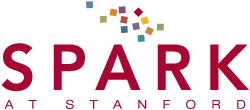SPARK is a unique partnership between university and industry experts
Building upon Stanford’s tradition of technological innovation and entrepreneurship, Chemical and Systems Biology Professor, Daria Mochly-Rosen, founded the SPARK program to provide a cost-effective model to generate proof of concept using out-of-the-box academic approaches combined with industry standards.
SPARK provides access to specialized knowledge and technical expertise regarding drug and diagnostic development, dedicated core laboratory facilities, and sources of funding to support translational efforts.

SPARK is based on five principles:
1. Multiple opinions
2. No need to reach consensus
3. Open exchange and no hierarchy
4. On University campus
5. Ongoing, two year program
SPARK at Stanford includes graduate level courses about the drug development process as well as a program for “SPARK Scholars”, which provides funding for their product proposals and mentoring for participants. Mentoring is provided by multiple advisors from the same field with expertise in product development, clinical care, and business, preparing participants for careers that link investigation with important new therapies.
Product proposals are reviewed annually by an expert panel of faculty and industry advisors. The panel reviews new, unlicensed disclosures made to the University Office of Technology Licensing as well as proposals submitted from across the university. SPARK Scholars (AKA “SPARKees”) are funded for an average of two years and participate in weekly seminars with industry and academic experts.
SPARK at Stanford is open to professors, clinicians, postdoctoral scholars, and graduate students. Our industry advisors play a vital role in the program through their mentorship and counsel. Other academic institutions have successfully replicated the Stanford SPARK model and we are committed to supporting their work.
